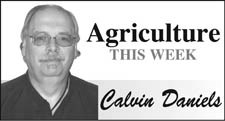Who should own farmland?
That is a question which will increasingly be asked as we move forward, and it is a question with an unclear answer.
There is of course a feeling among many that we should keep farmland owned by our neighbours as much as possible.
It would be nice if farmland was owned by those who will till the soil to grow crops, but that is no longer reasonable.
Farming is a multi-million dollar business these days and is increasingly one where the investment is beyond neighbouring farmers.
Even so-called family farms are today often corporate entities encompassing fathers, brothers, sons and other family members who work collectively to manage the scale of operation we now see as average farms.
But the question which remains is what happens as ever larger farms come on the market?
Neighbouring farmers may no longer have the capacity to simply amalgamate their farms with that of others in the area through a buy-out.
In Saskatchewan for a very long time farmland needed to be owned by residents of the province.
It was a strange precept as part of a country, where you would assume any Canadian's name on the title would be seen as appropriate.
Those rules have been relaxed but there are still rules governing offshore ownership of farmland.
The question is how inappropriate is the idea of someone in Europe or the Far East owning land which is then tilled by others?
It should always be remembered this country was formed via the efforts of immigrants. Often those immigrants would have no doubt accessed financial support from relatives, or friends in their country of origin, to help expand farm operations.
In this era we are seeing a new influx of immigration into Canada, and that includes to the Prairie provinces.
Often those immigrants have access to money, and land is a good investment.
That may not mean they want to ride a tractor, or haul grain to the elevator themselves, but they may well see land as a viable investment over the long term.
It may not be the farm industry we most want to see, but it could be the best way for farmers today to realize the best returns when they seek to retire and put their land for sale.
When one decides it is time to retire they are looking to ensure they have the funds to enjoy retirement and to help the next generation of their family. It matters not whether the cheque for the farm comes from someone down the road, or half a world away.
The answer of farmland ownership is a twofold one.
On the one hand it is a case of farmers releasing the greatest possible returns when retiring.
But there is also the issue of having control of a resource which is perhaps the most critical one to a country's long term viability since it is the source of food production. Even in a world of free trade holding local control of such a key resource is a compelling argument to make.
And the debate is one which remains to be defined as the face of agriculture continues to evolve.
Calvin Daniels is Assistant Editor with Yorkton This Week.




